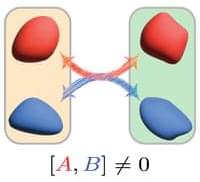Twesh Upadhyaya, William F. Braasch, Jr., Gabriel T. Landi, and Nicole Yunger Halpern PRX Quantum 5, 030355 – Published 23 September 2024 https://journals.aps.org/prxquantum/abstract/10.1103/PRXQuantum.5.
As an ice cube melts in water, the heat exchange d by the two produces disorder. Imagine measuring the heat flow while the ice melts in each of many trials. From the measurement results, one can compute the disorder generated in each trial—the stochastic entropy production (SEP). The SEP is well understood in the case of two classical systems interacting; there is one widely accepted SEP definition that can be expressed equivalently via three formulas. But the situation is far murkier for quantum analogues, such as two atoms exchanging components of spin.
Generalizing the three SEP formulas to accommodate quantum systems, we prove that quantum effects render the three SEP formulas inequivalent. Each formula reasonably quantifies entropy production and highlights a different aspect of the underlying physics. The inequivalence of the formulas stems from the inability to simultaneously measure the exchange d quantities of the quantum systems, i.e., the uncertainty principle. This quantumness leads to negative and even nonreal entropy production. Though unusual, these entropy values herald notable physical phenomena. A negative entropy production signals superposition in the thermal initial states of the quantum systems. An imaginary entropy production witnesses contextuality, a precise notion of nonclassicality.
Our work reveals new facets of entropy production for quantum systems, with potential implications for the performance of future technologies. For example, negative entropy production could be harnessed to improve the efficiency of a quantum engine.










Leave a reply